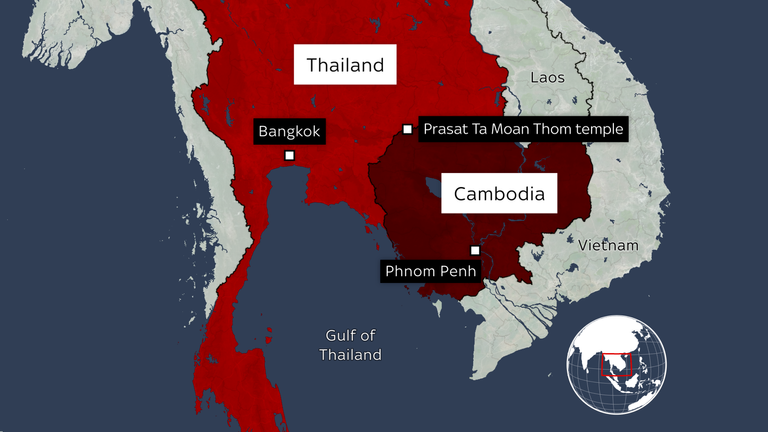Articles in this Cluster
29-07-2025
Thai and Cambodian leaders are set to meet in Malaysia for talks to end border hostilities that have killed at least 34 people and displaced over 168,000. The talks come after pressure from US President Trump, who suggested he would not move forward with trade agreements with either country if hostilities continued. Both sides have agreed to a ceasefire, with Cambodian Prime Minister Hun Manet saying his country will pursue an "immediate and unconditional ceasefire." Fighting continued on Sunday despite the US diplomatic intervention, with both sides trading blame over renewed shelling and troop movements. The 800-kilometer frontier between Thailand and Cambodia has been disputed for decades, and the latest tensions erupted in May.
29-07-2025
Thailand has accused Cambodia of violating a ceasefire agreed upon on Monday, just hours after it was implemented, to end border clashes that have killed at least 33 people and displaced thousands. The Thai military claims it stopped firing after midnight but continued to receive gunfire from the Cambodian side, while Cambodia's defense ministry denies any armed clashes since the ceasefire began. The ceasefire agreement includes pulling back armies and accepting independent monitoring to prevent further clashes, following a meeting between the two countries' leaders brokered by Malaysian leader Anwar Ibrahim.
29-07-2025
Thai and Cambodian leaders have agreed to an "immediate and unconditional" ceasefire effective midnight to resolve deadly border clashes that have killed at least 35 people and displaced over 260,000. The agreement was made during talks in Malaysia, facilitated by Malaysian Prime Minister Anwar Ibrahim, who chairs the ASEAN regional bloc. The clashes began after a land mine explosion wounded Thai soldiers, with both sides blaming each other. The ceasefire was welcomed by US President Trump, who had pressured both countries to negotiate, and US Secretary of State Marco Rubio, who said the State Department is monitoring the situation closely.
29-07-2025
Thailand and Cambodia have agreed to an "immediate and unconditional" ceasefire after deadly border clashes that killed at least 35 people and displaced over 260,000. The clashes began on July 24, escalating from a long-standing dispute over their 817-km border, with both countries claiming territory based on a 1907 map drawn under French colonial rule. Tensions had risen in May after a Cambodian soldier was killed, leading to diplomatic expulsions and restrictions on trade and travel. The ceasefire was brokered by Malaysian Prime Minister Anwar Ibrahim, with the US President Donald Trump also playing a role in the negotiations. The dispute centers on territory, particularly around the Preah Vihear temple, which was awarded to Cambodia by the International Court of Justice in 1962 and reaffirmed in 2013.
29-07-2025
Taiwanese leader William Lai Ching-te has cancelled his overseas travel plans, reportedly due to rehabilitation efforts in southern Taiwan and US tariffs, after Washington declined his proposed stopover in New York, which is expected to ease the path for a possible meeting between Chinese leader Xi Jinping and US President Donald Trump this year.
29-07-2025
Thailand and Cambodia's militaries postponed talks to finalize a truce due to alleged violations, with Thailand claiming Cambodia continued clashes along the 500-mile border after a midnight ceasefire. Both countries' leaders later said the border had eased, with Cambodia's Hun Manet stating it was yielding "positive and effective results."
29-07-2025
Thailand's acting prime minister has sought to ease fears over a fragile ceasefire agreement with Cambodia after the Thai military reported violations of the deal, which was reached on Monday to end five days of fighting that killed 38 people and displaced hundreds of thousands along their shared border. The Thai military accused Cambodia of attacking Thai territory overnight, but Cambodia denied the allegations, saying there had been no new fighting. The ceasefire deal, brokered by Malaysia, has been met with a mix of hope and skepticism among affected communities, with the UN secretary general urging both countries to respect the agreement and create an environment conducive to lasting peace.
29-07-2025
North Korea's Kim Yo-jong issued twin warnings to the US and South Korea, rejecting any attempt to question its nuclear status and demanding recognition as a "nuclear weapons state". The warnings came after a White House official suggested President Donald Trump was open to talks with Pyongyang, and analysts see the move as Pyongyang's bid to control the diplomatic agenda on the Korean peninsula following the recent change of power in Seoul.
29-07-2025
Chinese Foreign Minister Wang Yi urged South Korea's new foreign policy chief, Cho Hyun, to adopt an independent foreign policy and oppose "decoupling" during their first official phone call. Wang called for a "stable, sustainable and predictable" China policy and deeper pragmatic cooperation. The two ministers reaffirmed their commitment to advancing bilateral ties and agreed to work together to make the upcoming APEC summit a turning point in their relations.
29-07-2025
North Korea's Kim Yo Jong stated that while ties between her brother Kim Jong Un and US President Donald Trump are "not bad", the country will not give up its nuclear weapons. Instead, she suggested that the US should accept North Korea as a nuclear state and find a new approach to restart talks, potentially by rewarding a partial surrender of its nuclear capability.
